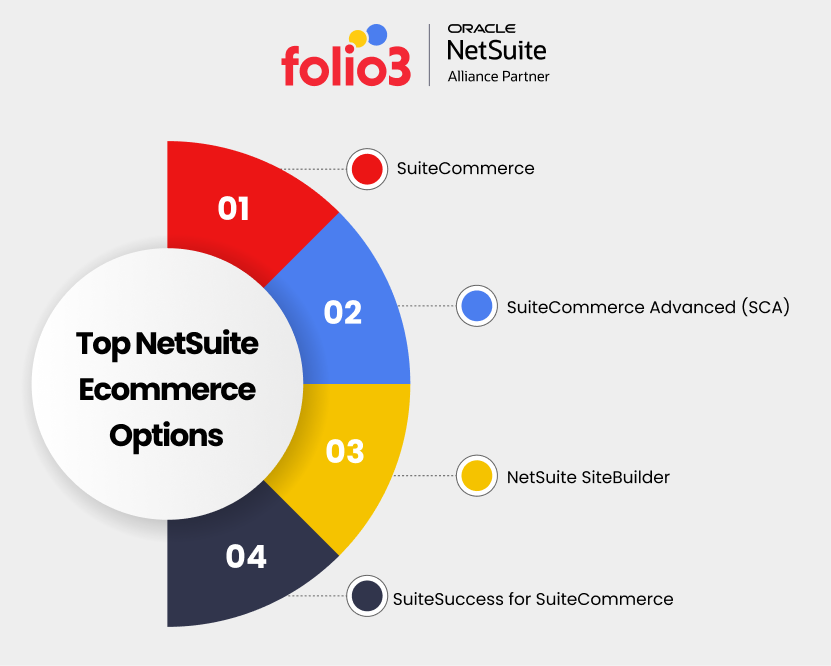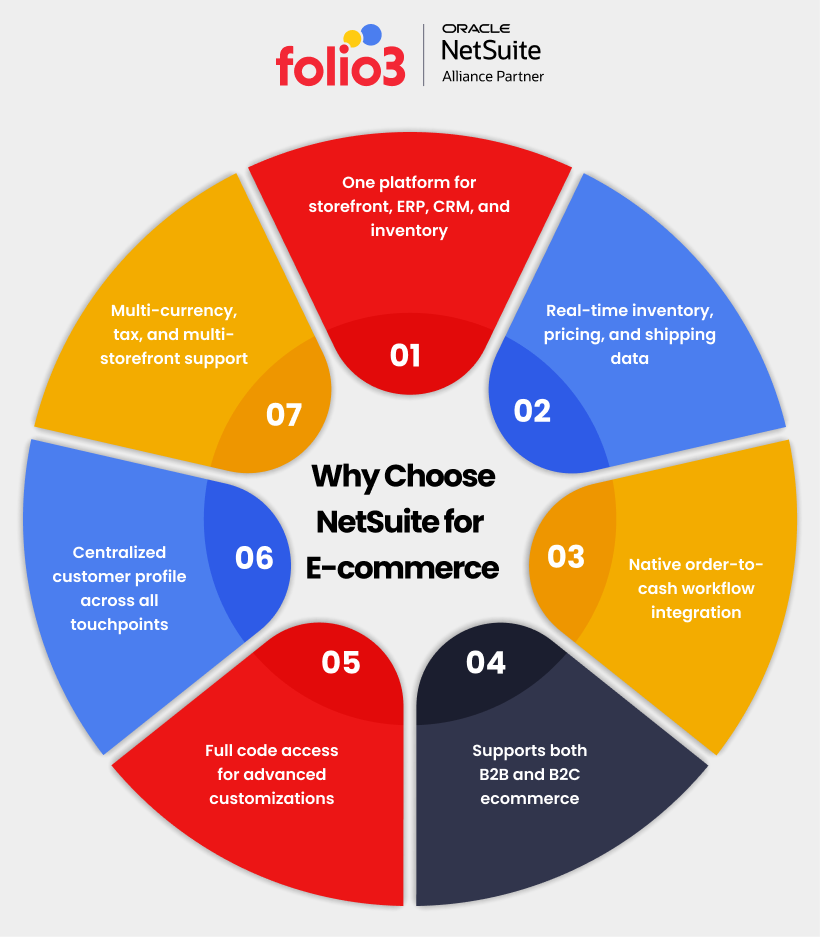NetSuite offers a B2B and B2C e-commerce solution known as SuiteCommerce. It is a 360-degree solution for e-commerce businesses as it handles finance and inventory management, pricing, payments, customer relationships, and taxes.
Additionally, it offers a website builder, order management, multi-channel selling, marketing and SEO tools, and CRM integration.
NetSuite eCommerce Solutions’ Position in the Current Market
According to a report by BuiltWithTrends, NetSuite ranks as the 13th most popular multi-channel ecommerce platform in the U.S. It’s also 10th among the top 10,000 websites using multi-channel ecommerce, 14th among the top 100,000, 17th among the top 1 million, and 16th overall across the entire internet.
NetSuite solutions for eCommerce are not one-size-fits-all. Businesses need to identify their requirements and then decide which plan suits them the best.
It offers multiple products, each built for different business models, technical requirements, and growth stages. That includes SuiteCommerce, SuiteCommerce Advanced, SiteBuilder, and the SuiteSuccess program that fast-tracks implementation.
This blog explains the top NetSuite solutions for e-commerce, enabling businesses aiming to expand to leverage them fully while understanding which one is the best fit.
Top NetSuite Ecommerce Options
There are various NetSuite solutions for eCommerce, and each solution has its own architecture, limitations, and use cases. From rapid deployment for B2C brands to full-code control for complex B2B models, each NetSuite solution for eCommerce is unique on its own. Here’s how they stack up

SuiteCommerce
It is a mid-tier eCommerce platform that is designed for businesses that want a modern and mobile-optimized web store that can seamlessly integrate with their ERP.
It has a set of built-in themes along with responsive design, SEO tools, and standard checkout flows.
Below is a quick overview of SuiteCommerce.
- Good for: Brands that need fast time-to-market and don’t require heavy front-end customization.
- Tightly integrated: Real-time sync with inventory, order management, pricing, and customer data.
- Limitations: While you can extend it, deep front-end customizations or advanced UX features will quickly push its boundaries.
Key Features of SuiteCommerce
One of the key features of SuiteCommerce is that it is a unified eCommerce application and is deployed natively on NetSuite’s platform.
It runs on a tightly coupled architecture, which translates into that it inherits your ERP model without requiring any third-party middleware.
There are some other important factors to it as well that include frontend, backend, customization, performance, deployment, and limitations. Let’s take a look at them below.
Frontend
Delivered as a single-page application (SPA) with basic theming and templating via Handlebars.js. Limited access to DOM and framework-level customization.
Backend
Fully integrated with NetSuite’s core modules (Items, Customers, Pricing, Promotions, Orders). Uses SuiteScript and SuiteFlow for backend logic and automation.
Customization
Controlled through extensions and configuration, not full code access. Extensions must be packaged and deployed via the SuiteCommerce Extension Framework.
Performance
Runs on NetSuite’s managed CDN with prebuilt caching and minification strategies. Supports multi-site and multi-language configurations.
Deployment
Delivered through the NetSuite Commerce Extension Developer Tools (CET), it is a CLI-based workflow to build, test, and deploy changes.
What are the limitations of SuiteCommerce?
The main limitations that users experience in SuiteCommerce are custom checkout flows, dynamic pricing rules, and integrations. Even though basic SEO features are available, there is a lack of flexibility for advanced features.
Ongoing support and updates typically require a NetSuite partner or an internal IT team.
Folio3 has vast experience helping eCommerce businesses implement SuiteCommerce. Contact us if you have any questions.
SuiteCommerce Advanced (SCA)
Another NetSuite solution for eCommerce is SuiteCommerce Advanced, which gives you full access to the application’s source code and allows deep customization of the frontend and logic layer. It is mainly for enterprises and is considered equivalent to Magento in terms of capacity and flexibility.
Not only that, but it also gives developers full access to the core code that enables them to customize and deliver a unique online experience.
It’s also ideal for businesses with in-house developers or a technical partner who can handle version control, modular development, and performance optimization.
Below is a brief overview of SuiteCommerce Advanced:
- Good for: Businesses that need pixel-perfect control over storefront design, custom checkout logic, or integration with third-party tools.
Development flexibility: Built on a modular architecture using Backbone.js, RequireJS, and Sass. - More overhead: Requires ongoing development resources for version upgrades, testing, and optimization.
Key Features of SuiteCommerce Advanced (SCA)
One of the key features of SuiteCommerce Advanced is that it acts as an omnichannel platform and also delivers an experience to users that is both robust and optimal. Using SCA, you can easily connect emails, social, and in-store marketing with endless online platform modifications and interaction possibilities.
Let’s take a look below at its technologies, such as architecture, frontend, backend, etc.
Architecture
Modular AMD-based system using RequireJS, Backbone.js (MVC), and Sass. Enables dynamic page rendering, component reuse, and client-side routing.
Codebase
Full Git-based version control support with extensible JavaScript and service layers. You can override or extend virtually any module.
API Layer
Integrates with NetSuite’s SuiteScript 2.x APIs for deep backend custom logic. SuiteScript RESTlets can be exposed to external systems.
Customizations
Full checkout customization, real-time cart logic, custom PDP (product detail page) logic, and UI component layering.
Scalability
Suitable for high-traffic environments; custom code can be optimized at the middleware and frontend levels.
Maintenance
Requires regular patching and version upgrades. Every NetSuite release needs regression testing and possible refactoring of custom modules.
For brands running on external platforms but managing operations in NetSuite, we offer ready-to-deploy NetSuite connectors for Shopify, Magento, WooCommerce, and BigCommerce
What are the limitations of SuiteCommerce Advanced (SCA)?
Even though it offers deep integration with NetSuite ERP and also allows full code-level control, it has some technical constraints.
It relies on an older frontend stack (Backbone.js and RequireJS), and upgrades can be complex due to version lock-in.
It’s not headless, so the frontend and backend remain tightly coupled, which can limit flexibility in modern architectures.
Developers may also face a learning curve, and deployment must follow NetSuite’s tooling and processes.
While it’s highly customizable, teams should plan carefully to manage performance and long-term maintainability

Folio3 has won the NetSuite Spotlight Award in the SuiteCommerce vertical, TIWCE! With a proven track record of successful SuiteCommerce implementations, we’re here to help your business grow. Contact Folio3 today to learn get started.
NetSuite SiteBuilder
As the name suggests, SiteBuilder is NetSuite’s original ecommerce tool, i.e., simple, functional, but very outdated by today’s standards. It enables businesses to launch online storefronts directly integrated with their ERP system.
It supports basic online storefronts and works well with NetSuite’s backend, but it lacks modern design capabilities and extensibility.
- Good for: Legacy users who haven’t migrated yet or businesses with minimal e-commerce needs.
- Limitations: No responsive design out of the box, very limited customization, and poor user experience by modern standards.
- Deprecated: NetSuite no longer actively develops SiteBuilder, and it’s not recommended for new projects.
The main strengths of the NetSuite SiteBuilder include its out-of-the-box ERP sync, as it is fully native to NetSuite. In addition to that, it has a low initial setup, and businesses can set it up without having technical assistance or a team.
Lastly, it is secure and managed directly on NetSuite’s infrastructure, which eliminates the need for third-party SSL management or patching.
Below are the technical details you need to know about NetSuite SiteBuilder related to its architecture and technology stack:
Rendering Model
SiteBuilder relies on server-side HTML rendering. Pages are generated dynamically on the server and pushed to the browser, leading to full-page reloads for every action.
Templating
Customization is done using HTML templates edited through the NetSuite UI. JavaScript support is minimal and typically used for simple client-side interactivity.
ERP Integration
Tight coupling with NetSuite’s item records, pricing, tax, inventory, and order management — no middleware needed.
Theme Control
Basic branding is possible via CSS and HTML edits. There is no concept of reusable components or modular styling.
What are the Limitations of NetSuite SuiteBuilder?
Even though it is a stable platform for e-commerce, it has become dated, which puts it at certain limitations in its functionality.
A few of the limitations include that it lacks responsive design unless it is heavily customized.
There is no single-page app behavior or even PWA support; therefore, all interactions with the site will cause full-page reloads that also lead to performance issues.
Also, it has outdated design patterns and limited customization, as users can’t extend it with Suitecommerce extensions or SCA modules.
Migration Path
NetSuite recommends migrating from SiteBuilder to SuiteCommerce or SuiteCommerce Advanced for ongoing support, access to new features, and modern ecommerce capabilities. However, this process involves replatforming your templates, customizing your data model, and possibly revisiting your integrations and workflows.
SuiteSuccess for SuiteCommerce
SuiteSuccess is a pre-packaged implementation methodology that bundles SuiteCommerce with NetSuite ERP, using preconfigured templates and industry-specific workflows. It’s built to reduce implementation time and cost by sticking to a standardized rollout model.
- Good for: It is one of the best NetSuite solutions for eCommerce for SMBs that want a quick, clean launch without reinventing the wheel.
- Fast deployment: Typically live in 100 days or less with predefined roles, KPIs, and workflows.
- Trade-offs: Limited flexibility out of the box. Custom features may require post-go-live enhancements.
Below are the technical details and what’s in it that businesses must know about SuiteSuccess for SuiteCommerce:
Preconfigured Store Theme
Comes with a mobile-responsive, modern web store layout designed to support B2C and light B2B needs. The base theme can be customized using SuiteCommerce tools.
Built-in Integration
Full synchronization with NetSuite ERP modules, including inventory, pricing, order management, tax rules, and customer data.
Predefined Roles and Workflows
Business roles (e.g., web customer, ecommerce manager) and approval processes are already configured based on industry norms.
Sample Data and Catalog Structure
Accelerates setup by providing a sample product hierarchy, categories, and item records.
Training and Support Materials
Admins get guided training content, sandbox environments, and structured onboarding support from NetSuite partners or NetSuite directly.
Built on SuiteCommerce (not Advanced)
SuiteSuccess implementations typically use the standard SuiteCommerce framework — not SuiteCommerce Advanced, which means you get a managed, upgradeable platform with limited code-level control.
Customizability
You can still extend the storefront using SuiteCommerce extensions and configuration options, but heavy custom scripting (like you would do in SCA) is discouraged.
Deployment via SuiteCommerce Extension Framework
This keeps upgrades and maintenance clean. Extensions are modular and deployed using the SuiteCloud Development Framework (SDF).
What are the key limitations in SuiteSuccess for SuiteCommerce?
Even though SuiteSuccesses for SuiteCommerce is a top-notch package, but it has certain limitations as well. These limitations include less flexibility in making architectural changes. If your business has very specific UX requirements, unusual workflows, or third-party integrations, the standardized model may fall short.
In addition to that, while SuiteSuccess supports B2B features (e.g., customer-specific pricing, login-gated storefront), more advanced B2B commerce logic often requires additional customization.
Why Should You Choose NetSuite for E-commerce?
NetSuite stands out as it treats e-commerce as an extension of your core business operations. For every e-commerce organization, it presents a solution with cloud ERP as the front-end and SuiteCommerce as the interface.
Below are the reasons you should consider using NetSuite solutions for e-commerce:

Everything Under One Roof
Instead of integrating eCommerce, inventory, CRM, and order management through third-party tools, NetSuite brings it all together in one environment.
Your website isn’t running on a separate system; it’s part of the same cloud suite your finance and operations teams are already using. This means less complexity, fewer support issues, and a cleaner data flow.
Real-Time Inventory, Pricing, and Orders
When your ecommerce platform pulls data directly from your ERP, customers always see the correct inventory levels, accurate pricing (including discounts, tax, and shipping), and available delivery options.
You don’t need batch jobs or nightly syncs. It’s all updated live, so there’s no risk of overselling or showing outdated information.
Native Order Management
Another reason to choose NetSuite solutions for eCommerce is that the orders placed through the web store flow directly into NetSuite’s order-to-cash pipeline. That includes automated invoicing, picking and packing logic, fulfillment status updates, and returns.
The e-commerce transaction becomes just another part of your standard process, not an isolated workflow that needs to be manually pushed into your ERP.
Built for Both B2B and B2C
Whether you deal with business or customers, NetSuite has every solution for everyone.
From selling with fast checkout flows, or handling complex B2B transactions (like customer-specific pricing, negotiated terms, purchase approvals, or scheduled reorders), NetSuite can handle both.
SuiteCommerce supports gated portals, customer segmentation, and workflows that match how your buyers operate.
Customizable for Developers
SuiteCommerce Advanced (SCA) gives full access to the underlying codebase. Developers can build custom user interfaces, add new checkout flows, integrate third-party APIs, or write business logic to automate tasks.
You’re not boxed into templates. If you have a dev team (or a partner like us), there’s a lot of room to make it your own.
A 360° Customer View
Every online order, payment, support ticket, return request, and marketing touchpoint lives under a single customer record. Integrating Aircall’s call center software further enhances this unified customer record by capturing every call and interaction seamlessly. This ensures your support and sales teams have immediate access to all communication details, enabling more personalized and efficient service. As a result, your marketing efforts become even more targeted and effective.
This allows your support and sales teams to see the full picture, and your marketers to build smarter segments for email and automation.
Our Recommendation
Choosing the right NetSuite solutions for eCommerce depends on a number of factors such as your business objectives, customer base, technical resources, growth plans, and the complexity of your operations.
- If you’re launching a new store with basic needs, start with SuiteCommerce. It offers a clean UI, responsive design, and direct integration with NetSuite’s ERP, ideal for small to mid-sized businesses that don’t need deep customization.
- If you require full control over the front end, complex B2B workflows, or advanced integrations, go with SuiteCommerce Advanced. It’s a better fit for companies with in-house developers or a partner like Folio3 ADM that can handle code-level customizations.
- Still using SiteBuilder? It’s time to move on. NetSuite no longer actively develops it, and it lacks the flexibility modern ecommerce requires. Migrating to SuiteCommerce or SCA ensures long-term support and better performance.
- SuiteSuccess for SuiteCommerce is ideal if you want a guided implementation with pre-configured features, best practices, and a faster go-live timeline. It works well for businesses that want structure and predictability in their rollout.
Add
If you’re currently using platforms like Shopify, WooCommerce, or BigCommerce and want to connect them to NetSuite, we have pre-built connectors that can help you avoid custom builds and speed up deployment.
FAQs
What is the difference between SuiteCommerce and SuiteCommerce Advanced?
SuiteCommerce is designed for quick deployment with limited customization. It offers responsive design, native integration with NetSuite, and standard features that are suitable for most businesses. On the other hand, SuiteCommerce Advanced gives full access to the codebase that allows deep front and back-end customizations, integrations, and advanced performance optimization.
Is NetSuite suitable for B2B commerce?
Yes. NetSuite solutions for eCommerce support B2B features like contract pricing, bulk ordering, credit limits, custom catalogs, and multi-level approval workflows, all within the same platform that manages inventory, CRM, and finance.
Can I migrate from SiteBuilder to SuiteCommerce or SCA?
Yes, and it’s recommended. SiteBuilder is outdated and lacks modern eCommerce capabilities. Migrating to SuiteCommerce or SuiteCommerce Advanced ensures a responsive design, better performance, and ongoing product support from NetSuite
Conclusion
NetSuite solutions for eCommerce are totally user-centered and can help scale business growth. From B2C brands to B2B distributors, NetSuite offers solutions that are second to none. It helps in streamlining your business operations and improving the customer experience. But picking the right fit and implementing it well takes experience.
At Folio3, we align NetSuite to how your business really runs. From SuiteCommerce to custom SCA deployments, we’ve done it all.
Contact us today to get started.
